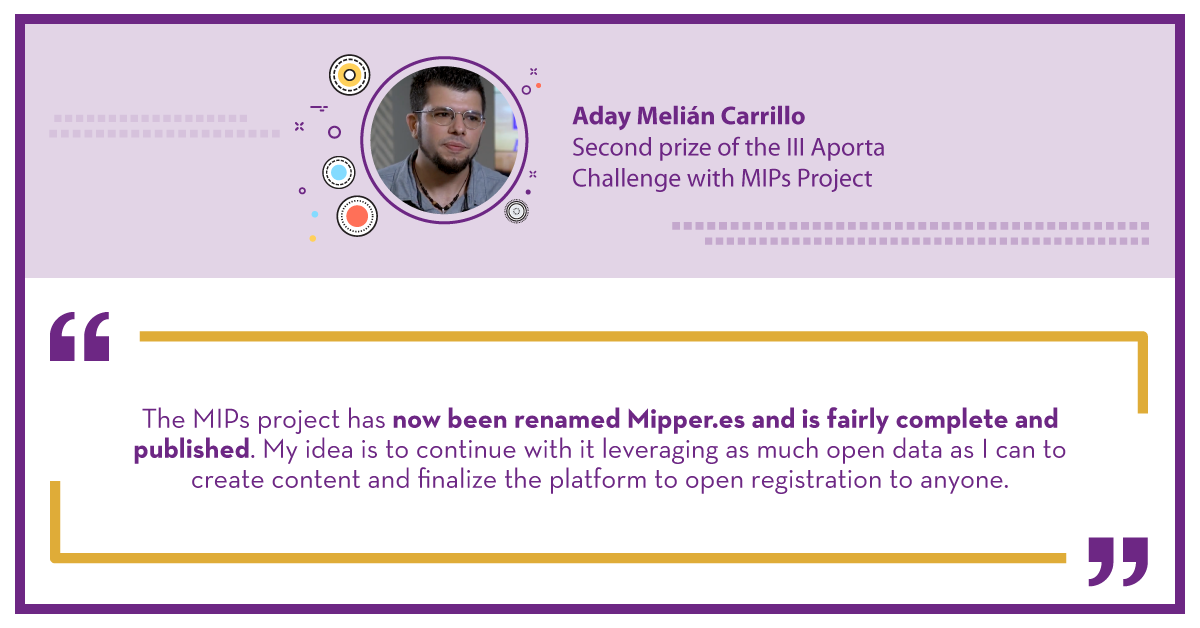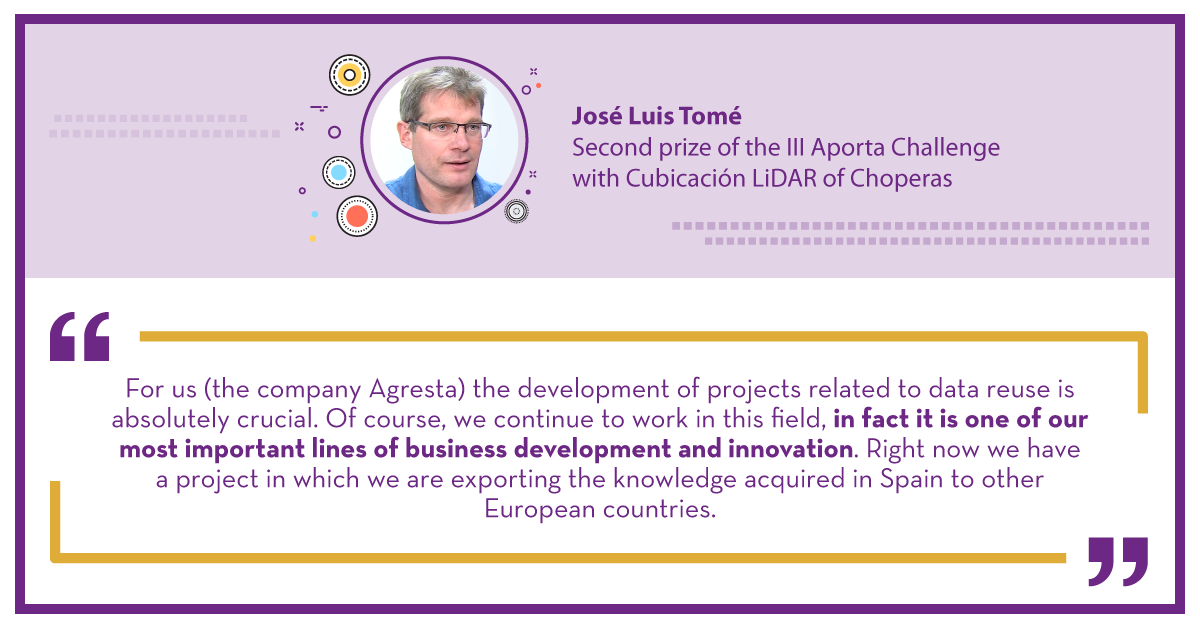After several months competing, on 20 October the open data contest organised by the EU came to an end. The EU Datathon is a contest that gives data developers and scientists the chance to demonstrate, through their creativity, the potential of open data.
Although in this post you can find out in detail about the winning projects, in this case we would like to highlight the participation of two Spanish developers whose initiatives were chosen as semi-finalists from amongst the 156 proposals submitted at the start.
In an edition that broke the attendance records, both in terms of the number of contestants and the countries of origin, Antonio Moneo and Manuel Jose García represented Spain with two projects which stood out for their innovative nature regarding the reuse of open data.
Using Artificial Intelligence to optimally solve public tenders
Manuel José García has a PhD in Telecommunications Engineering from the University of Oviedo and currently works as a data scientist at the technology consultancy NTT Data. After scooping up first prize in the Euskadi Open Data contest in 2020, García decided to take part in the European hackathon, making the most of what he had learned from the research carried out in his PhD thesis and which gave rise to the project 'Detection of irregular tenders in Spain through big data analytics and artificial intelligence'.
"It is an initiative that uses Big Data and Artificial Intelligence (AI) to analyse the data from public tenders and to automatically recommend those companies that can best undertake the tender. With this in mind, a search engine is created for companies that can carry out a tender and a form is filled out describing the details that characterise the public tender. From that point onwards, the programme seeks the most suitable companies to carry out the project”, describes Manuel Jose García, who adds that the list of companies recommended by tender is achieved thanks to the fact that the AI model has been trained with the history of hundreds of thousands of tenders and winning companies from the past, learning what type of companies win tenders and what characteristics they have.
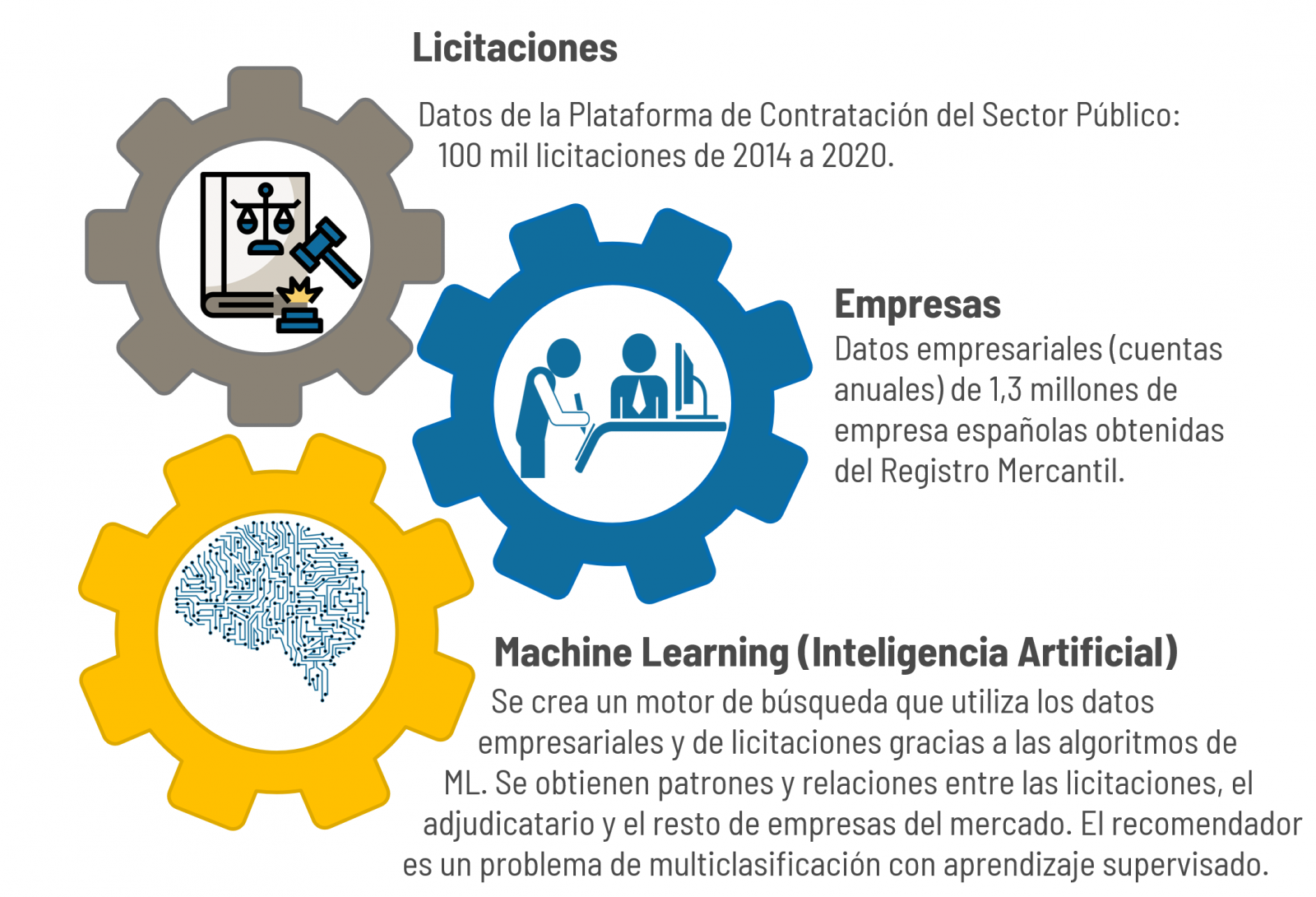
An essential requirement in order to participate in the European datathon is to use information from the data catalogues that both Europe and Spain make available to the public at a national, regional and local level. In the specific case of Manuel José García, his project has been developed using the public tender data available at the Public Procurement Platforms.
“The project has been developed using two types of data sources. On the one hand, the public and free data of the tenders and, on the other, the business data required to search for and characterise the companies present in the search engine. In particular, the annual accounts that companies must submit to the Registrar of Companies have been used. These data are public but paid and it is vogue to make them free as they are data managed by a public entity”, comments the data scientist.
In fact, it is precisely this point related with the data from the Registrar of Companies which entailed a challenge to take the project forward: “Getting structured data from public tenders is complicated, since the open data format of the Spanish Procurement Platform is difficult to handle. In addition, it is necessary to carry out thorough cleaning of the data because their quality is low”, he points out.
In his opinion, if public administrations wish to promote the reuse of open data, “They must promote the culture of data. In other words, to be aware of the importance of the data they handle and store and, in turn, be proactive to exploit said data and make them available to third parties”.
Architecture and open data to make the Sustainable Development Goals visible
In addition to being the Director of Change Management and Advanced Analysis at BBVA, Antonio Moneo was also a semi-finalist in the latest edition of the European datathon thanks to a project that merges art with the dissemination of open data.
“Tangible Data is an initiative whose goal is to convert emblematic data series into physical sculptures and thereby be able to lend visibility to issues such as climate change, inequality or the transparency of our governments. Against a backdrop of excess information and a growing digital divide, it is essential to rely on the physical environment to explain what is happening in the world", explains Antonio Moneo and he stresses that "representing data in a sculpture allows us to present a challenge from an objective, respectful perspective”.

When selecting the open data sets, Moneo was clear that he wanted to make visible the realities and statistics related with the Sustainable Development Objectives so that his project would fulfil the social purpose that led him to participate in the datathon: “We use open data from reliable sources and properly licensed with Creative Commons or MIT criteria. Sometimes we have used a private data source, but our objective is to enhance the information that is already available. In addition, we usually use the data in the manner in which they are published and only apply some transformations such as the smoothing of the curves with moving averages that allow us to make the sculptures more pleasant to the touch and, self-evidently, techniques to create volumes in three dimensions that are the basis for the sculptures," he observed.
Hence, to carry out Tangible Data it has been necessary, on the one hand, to build a physical structure and, on the other, to make it invite the user to move to the digital realm where, at the end of the day, the information they seek to make visible can be found. “The first step is to design a 3D model in virtual format which we send off to be produced locally, using the FabLabs network. Later, we include a QR code in the sculpture that allows the audience to know in depth the meaning of the data that it reflects”, explained the promoter of the project.
Developing such an ambitious project, both from a physical point of view and from an informative perspective, is no easy task. The thing is, it is not only a matter of circumventing the design of the sculpture as such, but also of finding the necessary data to transfer the reality that it is sought to represent: “Comparability is one of the biggest challenges we have encountered because, in many cases, the most relevant data for measuring the environment are not always comparable. Sometimes we find data at a regional level, sometimes at a national or local level, but it is not always possible to find all the information you need. This is why, in order to solve this challenge, we have invested more time in searching for data and, in many cases, the initial idea about a sculpture has been modified because we could not find data of sufficient quality”, he went on to say.
Moneo also commented that the other major difficulty that has marked the development of the project has been to access updated data. “Updating is always a critical issue, but right now it is even more so. The consequences of COVID, the war in Ukraine and the current energy crisis paint a very different world from the one we encountered in 2015, when the sustainable development objectives were signed. For example, it is estimated that as a consequence of the pandemic, between 70 and 150 million people will fall into the extreme poverty segment (with less than 1.9 dollars a day). This change, bucking the trend of the last three decades, is not reflected in the World Bank statistics yet as they only go up to 2019. It would this seem that that very relevant data reflect a distorted reality”, he concluded.
A positive review of his time in the EU Datathon
Despite not having reached the final that would have allowed them to compete for part of the total prize, which amounted to 200,000 euros, the two participants agreed that their experience in the datathon has been more than positive. So, whilst Manuel José García believes that "the European Commission must continue to commit to these initiatives so that people are aware of the value of data and the challenges that they can solve”, for his part, Antonio Moneo points out that “this type of action motivates the agencies that drive the data and those who are developing to improve the impact of data on society”.
What's more, both participants have managed to stimulate their professional curiosity thanks to this challenge, whilst simultaneously testing the potential and quality of their respective work vis-à-vis European data experts.
Aragón Open Data is 10 years old and to celebrate it they have launched a datathon entitled "The future of data". The event will take place on 25 November.
What is the datathon about?
The aim of the meeting, organised together with Fractal Strategy, is for citizens to experiment and generate new ideas based on open data that add value to society.
Aragon open Data will propose six challenges. Participants will have to choose one of the challenges or propose another of their choice. Throughout the day they will have to work in teams to create a new service that responds to the selected challenge, using a series of outstanding open datasets available in Aragon Open Data.
At the end of the day, a winning solution will be chosen based on three criteria: the novelty of the proposal, idea or service, its impact on society and the quality of the presentation where the two previous points are defended. Each member of the winning team will receive a voucher worth 50 euros to be exchanged in commercial surfaces in Aragon.
Los retos disponibles son los siguientes:
The following challenges are available:
- Connect with nature. This challenge will include solutions that map resources and points of interest for learning, doing sport or rural tourism, working from less populated places, enjoying leisure time or sharing experiences while enjoying nature.
- More lively neighbourhoods. In this case, solutions are sought that focus on young people and families of the future, addressing issues related to accessible housing, public and sustainable transport, local commerce, etc.
- Employment opportunities. This challenge is aimed at generating proposals that help people to find new employment opportunities in Aragon, through ideas for new industrial products, business initiatives or the mapping of commercial activity, among others.
- University life. With the aim of helping students to make decisions, solutions aimed at planning efforts, making professional contacts, discovering new fields of study and research, etc., will be valued.
- Conocer Aragón. Este reto se enfoca en destacar la oferta de ocio, hostelería y alojamientos, el patrimonio, la agenda cultural o las propuestas de turismo de la región con el fin de darla a conocer a locales y visitantes.
- Getting to know Aragon. This challenge focuses on highlighting the region's leisure, hospitality and accommodation offer, heritage, cultural agenda and tourism proposals in order to make Aragon known to locals and visitors.
- Renewable energies. The last challenge focuses on solutions to advance the sustainable use of energy and the development of new sources of energy resources.
Who can participate?
The event is open to both students and professionals from various fields, including communication, documentation, engineering, design, humanities, social sciences and law.
Participants will work in multidisciplinary teams, which will be formed on the day of the competition. If a participant comes with his or her team already formed, he or she can indicate it in the registration email.
Where does it take place?
The event is face-to-face. It will be held at the headquarters of the Centro de Artesanía de Aragón // Centro Aragonés de Diseño Industrial (CADI), in the building of the Old Municipal Slaughterhouse of Zaragoza, entrance on Calle del Monasterio de Samos, 42 (Zaragoza), on 25 November 2022, from 10:00 to 19:00.
Attendees should bring their own computer.
Food and drink will be provided by the organisers.
How can I register?
Registration is free and will be open until 23 November 2022 at 14h. To do so, please send an email to opendata@aragon.es with your name, age, profession / field of study and the subject "Registration for The Future of Data". If you already know which challenge you want to focus on, it is recommended that you also include it in the email.
These types of competitions are an excellent opportunity to put your knowledge into practice, learn from those with more experience and make new contacts. For these reasons, an increasing number of companies are using hackathons as a mechanism to locate and attract talent.
More information about the datathon on the Aragon Open Data website.
60 participants, 10 mentors and €2,000 in prizes. These are the figures managed by DiValHack, the Hackathon promoted by Red.es and the Diputación de Valencia to bring the project "Connecta Valencia: Smart and Sustainable Tourism Territory" to the citizens. This project, financed by the public entity Red.es with FEDER funds, seeks to improve the tourism competitiveness of Valencian municipalities, increasing their knowledge to offer a better and more sustainable experience to tourists.
What is DiValHack?
DiValHack participants must develop a technological solution that responds to a challenge using the resources and infrastructures that Connecta Valencia offers.
Participants can propose a challenge of their choice related to Connecta Valencia or try to respond to some of the organisation's proposals:
- Mobility challenges: for example, determining the actual congestion of different points of interest, helping to locate parking spaces or helping tourists to travel with a lower carbon footprint.
- Environmental challenges: such as monitoring the air situation or comparing environmental quality between municipalities.
- Tourism challenges: e.g. showcasing thematic routes or promoting nomadism and rural tourism.
Solutions that address several challenges, as well as combining different data sources, from Connecta Valencia and other external repositories, will be considered positively. For example, solutions that monitor noise in contrast to the influx of people or that recommend routes based on the weather or air quality.
When does it take place?
The hackathon will be held on 10 and 17 November 2022, starting at 12:30. Both sessions will be face-to-face.
In the first session, resources will be presented and teams and roadmaps will be defined.
During the week the teams will work on their projects, supported by online mentoring.
On the 17th, the teams will present their solutions, which will be evaluated by a jury, and prizes will be awarded to the three solutions with the best scores. The evaluation criteria are defined in the terms and conditions of the call.
Who can participate?
The hackathon is aimed at students and professionals. The only requirement is to be of legal age.
Participation will take place in teams of three to six people. The team should be multidisciplinary, including technological, financial, business, communication and/or social science profiles, as the evaluation criteria are not only technical.
What do the prizes consist of?
The three proposals with the best scores will receive cash prizes of 2,000 euros, distributed as follows:
- First prize: 1,000 euros
- Second prize: 750 euros
- Third prize: 250 euros
How can I participate?
Participation is free of charge. The deadline for registration is 30 October. To register you must fill in this form.
You can register alone or in a group. If you register alone, the organisation will find a group for you at the event.
Find out more about Connecta Valencia
The Connecta Valencia project has provided the 266 Valencian municipalities with the necessary infrastructure to analyse the flow of tourists in their territory, as well as their impact on the environment, by installing devices that measure mobility and environmental quality. This information allows informed decisions to be taken and public policies to be improved.
To this end, an open source platform has been set up to facilitate access to data through two mechanisms: an API and an open data portal that offers datasets in CSV and JSON formats. Among other information, users can access to data from meteorological and environmental sensors, mobility flows, etc.
You can learn more about the project in the following videos:
Technology is now an essential component of our daily lives. It is no secret that a large number of companies worldwide have been making significant investments in order to digitize their processes, products or services and thus offer greater innovation in them.
All this has led to an increase in the demand for technological profiles related to the data field by companies, organizations and institutions at an international level. However, in the current labour market this type of profile is not as abundant as the demand. This situation has also been exacerbated by the current health pandemic.
Hackathons: a new formula for attracting quality talent
One of the mechanisms that is gaining popularity to try to increase the recruitment of talent within the technological field are hackathons. These are data-related competitions or challenges whose main objective is to find solutions to real problems.
Hackathons offer the possibility for participants to test their knowledge and for companies to recruit talent for their teams. In fact, these challenges offer some advantages for companies looking to recruit new professionals by allowing them to:
- Observe how participants work
- Interact with them in a more relaxed environment
- Shorten selection process times
Some examples of company-driven hackathons
This mechanism is already used by companies around the world, even for several years. In Spain we find some examples such as the ‘Súper Hackathon BBVA’, whose objective was to find the best young engineering talent, while offering participants the opportunity to learn how to work within a large bank. Another example is the ‘KPMG Talent Hackathon’, whose challenge allowed the company to position itself as an employer brand among STEM students.
Also noteworthy is the ‘Hackathon FACSA Castellón’, an event that is held annually and whose objective is to seek the development of qualified talent, entrepreneurship and the promotion of a technological ecosystem that turns Castellón into a benchmark for innovation. In addition, this challenge symbolizes the collaboration between all the driving companies (Nayar Systems, Cuatroochenta, IoTsens and Eventscase) that support the initiative of the Association of Technology Companies of Castellón, Xarxatec. Among other advantages, this hackathon offers participants the possibility of accessing a job bank, allowing companies to attract talent, as well as promoting collaboration and teamwork.
Popular Internet hackathon platforms to recruit new professionals
These processes do not always have to be face-to-face. On the Internet we can find numerous platforms that offer coding challenges that put companies looking to attract talent in contact with users interested in showing their skills to technology companies and thus get a job opportunity. These tools allow companies of various sizes to have the opportunity to organize this type of competition, and broaden the geographic spectrum of the search, making it easier for candidates from different locations to compete on equal terms.
Here are some examples of these platforms:

Kaggle
Kaggle is one of the best-known platforms among developers. Focused mainly on learning through play (a technique known as gamification), it also offers companies a space for attracting talent. Some of the companies that have taken advantage of its benefits are Banco Santander, Facebook or Yelp.
You have more information in this previous article about Kaggle, where the gamification platforms DrivenData, Devpost, Innocentive and CrowdAnalytix.
HackerRank
It offers challenges for both home users who want to practice their coding skills and prepare for job interviews, as well as organizations looking to identify and hire new developers. Users of this platform can use Python, Java, JavaScript, PHP, C++ or SQL to solve the challenges presented from the instructions provided.
To learn more about this platform, in this article published by The House of Codes you can consult the top 50 challenges found in HackerRank.
Coderbyte
This application is dedicated to helping people solve problems at an industrial level. Like the previous platform, it offers a section for developers to prepare technically for future job interviews, and another one dedicated to companies that want to interview, evaluate and select candidates.
One of the main advantages of Coderbyte is that it presents challenges adapted to the needs of the main brands with which it collaborates, such as Google, HBO or PWC, among others.
CodinGame
Can you imagine being able to get a job through a gaming environment? This platform offers developers the possibility to solve programming challenges through a gamified experience. CodinGame features high-level algorithms and coders that offer solutions to both novice and expert developers.
In addition, it has a dedicated area exclusively for companies wishing to find the best developers thanks to its online coding tests.
Codewars
This platform allows developers to improve their skills through small coding exercises called 'katas'. One of its most outstanding qualities is the large number of languages available through which it allows challenges to be performed.
Qualified is Codewars' partner platform dedicated to organizations wishing to recruit new talent through its platform. Thanks to it, companies can benefit from its technical skills assessments to find professionals that fit their needs.
HackerEarth
This well-known platform not only presents coding challenges, but also hackathons and various kinds of competitions. Did you know that many of the challenges found on this platform can be asked in any job interview related to this field? This is because one of the services offered by HackerEarth is the proposal of recruitment solutions to top-tier technology companies.
In short, more and more companies, organizations and platforms are showing interest in participating and creating this type of challenge to achieve two main objectives: to attract talent and to increase the training and knowledge of their users.
It is also worth mentioning the European Hackathon Manager project, a tool for organising and coordinating this type of event. This tool has recently been tested by Aragón Open Data.
This has been just a small selection of platforms, but if you know of more platforms that may be of interest to our community, do not hesitate to write to us at dinamizacion@datos.gob.es.
Content prepared by the datos.gob.es team.
Hackathons, contests or challenges related to data are a different way to test your ideas and/or knowledge, while acquiring new skills. Through this type of competition, solutions to real problems are sought, often in multidisciplinary teams that share diverse knowledge and points of view. In addition to being divnamic and entertaining, they are a great opportunity to give visibility to your work or solution, expand contacts or improve your position in the job market.
Now that the registration period for the IV Aporta Challenge, we wanted to ask the winners of the previous editions how their experience was and what it brought them on a personal and professional level.
From ideas to viable businesses
So far, three Aporta Challenges have been completed, focused on the field of public administration, the agri-food, forestry and rural sector and the digital education, respectively.
The projects presented in the different editions have been very diverse: from master's thesis or research team projects to prototypes of already consolidated companies or ideas that have ended up becoming viable businesses. It is the case of Light, the winner of the first edition of the Challenge, in 2017. Light is an app that encourages people to be more sustainable in their daily lives through gamification, using data from Smart cities. After the Challenge, its creators continued working on the project, developing its business model.
Agesta, for its part, a company already consolidated before the Challenge, which took over the second prize of the II edition with a web system aimed at estimating the volume of poplars on a local scale. Agresta continues to develop highly successful projects both nationally and internationally.
Another example is UniversiDATA-lab, the winning solution in the third edition, whose final was held last summer. It is a public portal for advanced and automatic analysis of datasets published by universities. Also the second prize of this edition, the IPM project, continues to run after the Challenge is over.


Promotion of the labor profile in the market
In many other cases, the Challenge served as a platform to gain visibility and broaden the curriculum, which was influential in attracting the attention of various companies and institutions. This situation has left many creators without time to continue developing the solution presented in the Challenge -although they do not rule out taking it up again in the future-, but it has given them great possibilities for the future.

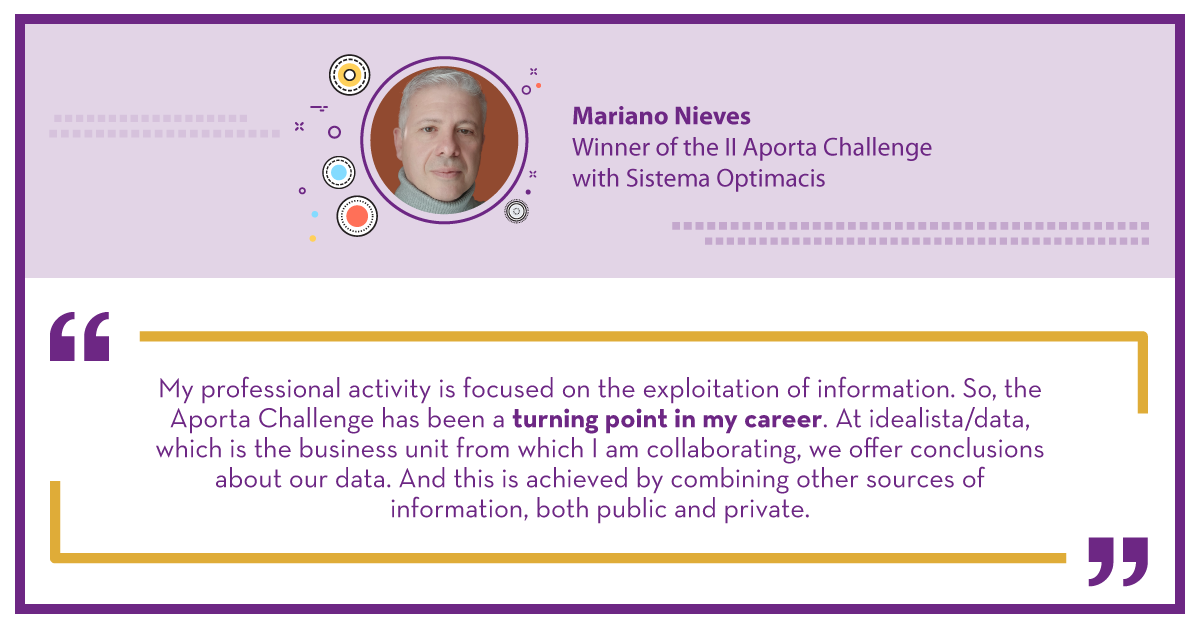

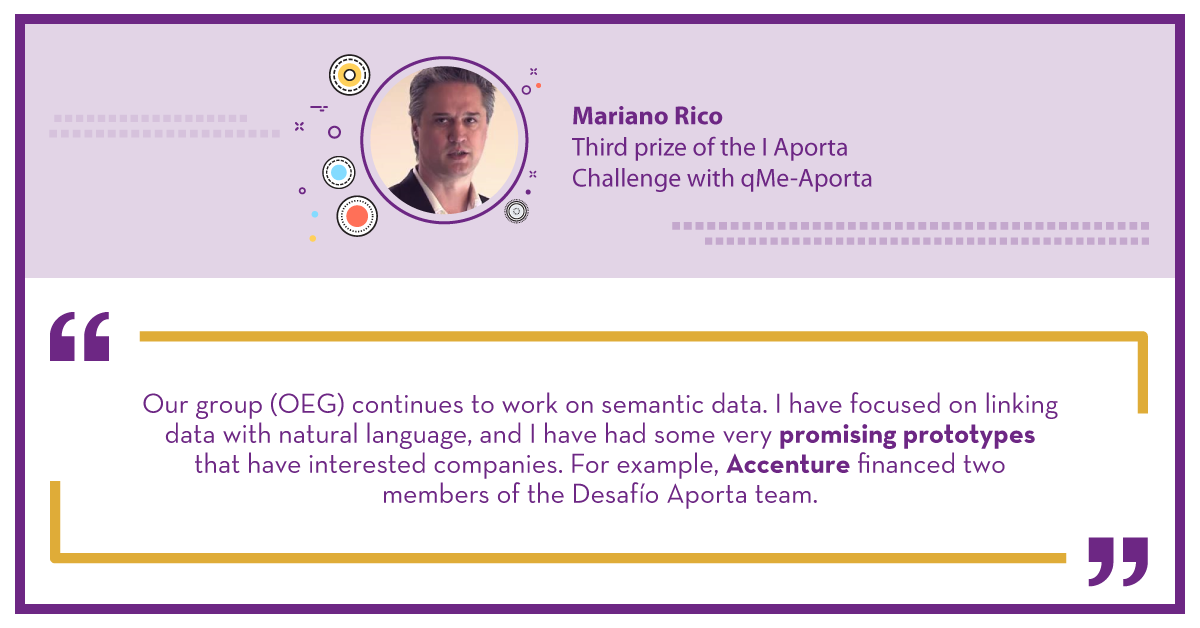
The experience of participating in the Aporta Challenge
But if there is something that the participants in the previous challenges stand out, it is the experience they acquired. The Aporta Challenge was an opportunity to shape an idea and develop a data project from scratch.

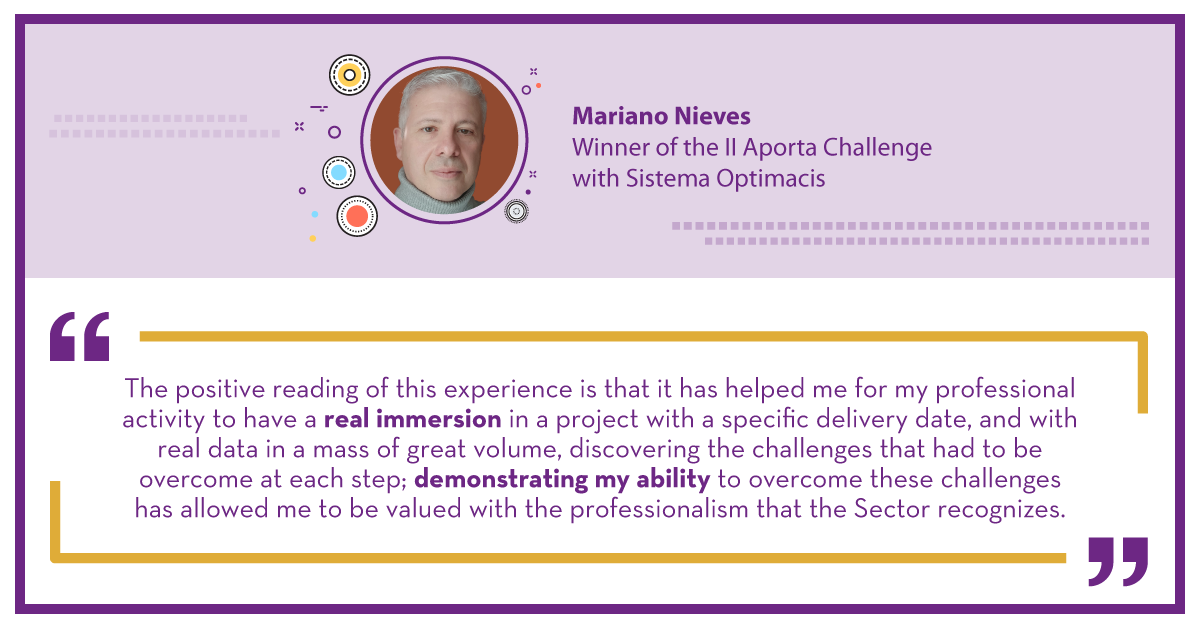
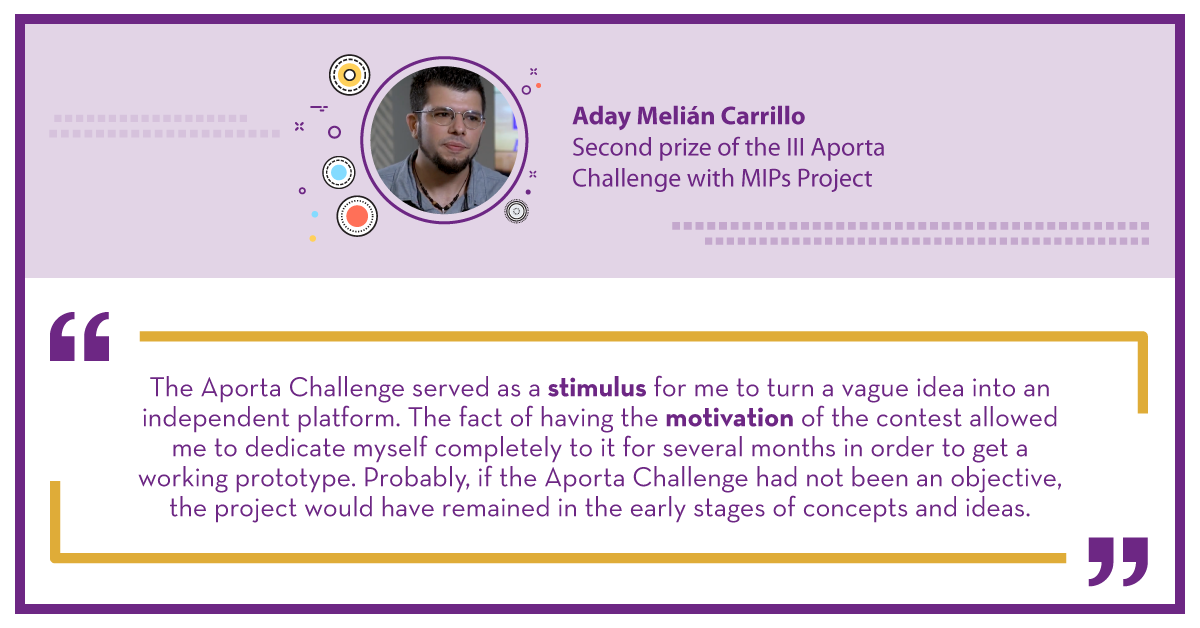

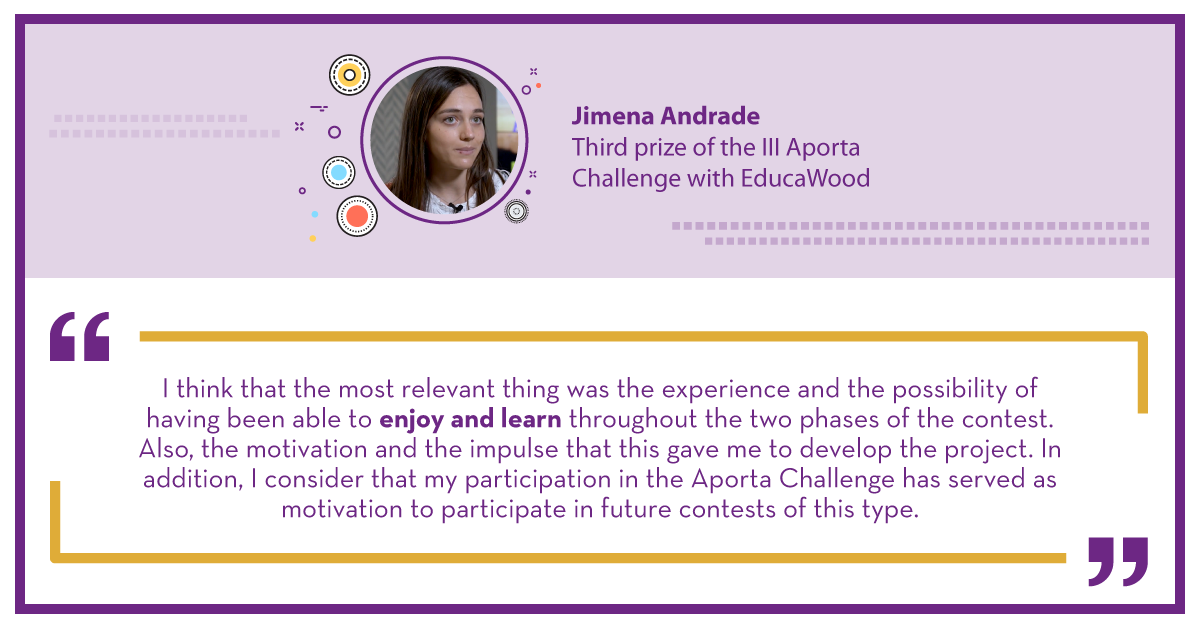

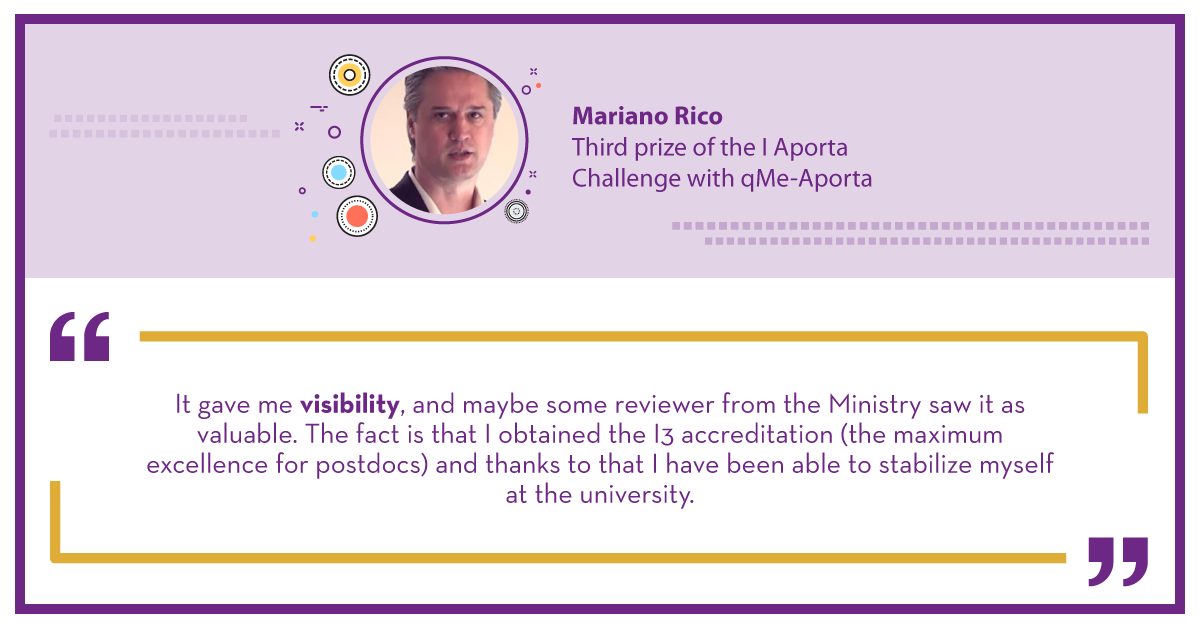
Do you want to participate in the new edition? The term is open until February 15
If you want to follow in the footsteps of the winners of the Aporta Challenge, we inform you that the fourth edition is still open. In this case it seek ideas for solutions aimed at driving improvements in the field of health and wellness, that use open data in their development.
To participate, you just have to fill out the form on the Electronic headquarters of Red.es, indicating what your idea is and its value to society, as well as the data sources you would use. You will also have to upload a video explaining the idea.
You have all the information in our web and in the challenge rules.
Go ahead and put your talent to the test!
Content prepared by the datos.gob.es team.
The Alcazar of Jerez de la Frontera will host, on 23 and 24 September, the II Regional Meeting of Smart Municipalities. Its objective is to advance in the smart development of Andalusian municipalities, in line with the UN Sustainable Development Goals. The event is organised by the Provincial Council of Cadiz and the Andalusian Federation of Municipalities and Provinces, with the collaboration of the Regional Government of Andalusia, the City Council of Jerez, the University of Cadiz and the Smart City Cluster.
More than 20 presentations and round tables will take place over two days. Industry 4.0, artificial intelligence, SmartAgriFood or digital administration are some of the topics that will be discussed. The full programme (in Spanish) can be seen here.
The event will also host a hackathon with the aim of boosting the use and intelligence of data.
Hack4ERMI2021
Under the motto "Objective Smart and Resilient Territory", participants in the hackathon will have to use their creative and innovative thinking to find concrete and feasible solutions to 4 challenges:
- Ecological transition, climate change and environmental sustainability 2.
- Resilience and security
- Data economy, competitiveness and progress
- Health and welfare
All solutions should have in common the use and exploitation of open datasets, which can be combined with other sources of public information or data from IoT devices.
open data sets, which can be combined with other sources of public information or information from IoT devices.
To participate, a team of two to five people is required. Teams should be diverse in terms of gender, expertise and experience.
The competition will take place in several phases:
- Preliminary phase, from 23 August to 10 September. Teams must submit a maximum of three ideas that respond to the challenges indicated above. To do so, they will have to submit a dossier explaining the idea and a video through the form provided for registration. A jury will evaluate the proposals and choose the five best ones, which will go on to the next phase. Those participants whose ideas have not been chosen may, if they wish, join one of the finalist teams.
- Workshop. 16th September. Selected teams will have the opportunity to participate in an online workshop to learn how to use FiWoo, a FIWARE-based Smart City platform.
- Hack4ERMI202: Ideas, Tech & Rock ́n Roll, 23-24 September. The teams will have a room available throughout the II Regional Meeting of Smart Municipalities, where they will be able to finalise the definition of the solutions presented. On the 24th they will present their proposals to the public at the congress.
The jury, made up of representatives of the organising and collaborating entities of the Meeting, will choose the 3 winners. The first winner will receive 2,000 euros, the second 1,000 euros and the third 500 euros.
If you have any questions, please contact the organisers by email at hack4ermi2021@dipucadiz.es.
Do you want to attend the II Regional Meeting of Smart Municipalities?
Participation in the hackathon is open to all citizens who wish to participate, but attendance at the II Regional Meeting of Smart Municipalities is limited, due to the pandemic situation.
Attendance in person is limited and by registration at the following link. However, the meeting can be followed online in its entirety via YouTube. The link will be available on the event's website in the coming weeks.
Hackathon Lovers is a community of hackathon lovers that holds regular events with a focus on solving technical problems in an innovative way.
In this interview they tell us about the advantages of this format and the challenge of going from face-to-face to online format.
Full interview:
1. Can you briefly explain what Hackathon Lovers is?
Hackathon Lovers is a technology company that organizes its own hackathons and helps other companies organize their own as long as they comply with non-abusive conditions for the participants that we have included in our ethical code (https://hackathonlovers.com/#principios).
2. What are the advantages of hackathons compared to other types of events?
Perhaps the biggest advantage is that with the solutions that are developed we can help solve real problems.
More bonds are created between the participants than in other events since you are working with them side by side for a couple of days without stopping and above all you learn a lot from your colleagues.
For the participants who are very juniors, they are a place where they can put into practice the knowledge they have, learn from those who already have more experience, make new contacts and, above all, who come out with projects that they can teach to find work.
3. One objective of this type of event is to address certain challenges that can be solved using public data. Would you like to highlight, by way of example, any of these and briefly comment on what kind of solutions the participants propose?
The use of public data in hackathons is quite common, since that public data can be used in conjunction with other APIs to develop better products than without that data.
For example, at #Hack4Good the map of the evolution of air pollution in Madrid was developed. At #DataFestMAD, a team developed an application that showed the optimal route between two points avoiding the pollution areas, and at #TWOC15 , the winning team developed an application that shows the reputation of places (neighborhoods) based on open data on crime, facilities and infrastructures.
The use of public data in hackathons is quite common, since that public data can be used in conjunction with other APIs to develop better products than without that data.
4. What kind of profiles come to your meetings?
This question depends on the challenge the hackathon is addressing. Normally the people who attend are from the technology sector and within this we can find profiles of web development, design, data analysis, blockchain ... Although we have also organized other types of hackathons in which people from the health sector (#Searchathon), legal (#JustiApps) and renewable energy (#Renovathon) have participated, among others because the challenge was more focused on these sectors .
5. What advice would you give to those who want to participate in a hackathon?
Let them sign up without fear. To participate in a hackathon you don't have to be a supercrack. The idea is to get together with other people with more / less level and work side by side to come up with a solution to the problem that arises, meet people from the sector or from other sectors, have a good time and learn.
6. The restrictions caused by the pandemic have been a challenge for you, how have you dealt with it?
A little because we have had to change and rethink the dynamics of a hackathon to adapt it to the online environment by using different platforms for communication during the hackathon. So we had to find which tools provided us with the functionalities we needed and at the same time that they were easy for the participants to use, and we even had to do some small development to facilitate our work.
7. What types of open data have you used in your projects and what data would you like to work with?
At the #OpenApiHackathon on Open Banking organized by Liberbank and atmira, Liberbank made available to the participants its catalog of Open Banking APIs developed following the technical guides of Directive 2015/2366 on payment services in the internal market, PSD2, standard community that obliges financial entities to share their data.
The API catalog dealt with Payments, Oauth Provider, Accounts, PSD2 Registration, and there were two work environments, a first using a Sandbox development environment and later a second step to Pro.
8. Finally, how can interested people follow Hackathon Lovers and collaborate with you?
You can follow us on twitter and join our meetup, where we have a mailing list in which we announce both the hackathons that we organize and those that we see that comply with our code of ethics.
September arrives, the holidays are over - with permission from those who have chosen this month to enjoy their well-deserved rest - and with it all sectors are returning to day to day routine. Although during these summer months many organizations have not stopped promoting activities around open data, such as the Government of the Canary Islands, it is now, with the autumn, when the level of activity increases.
Large format conferences
September, October and November are the months chosen by many organizations to hold general theme events that bring together a large number of audiences. In addition to the International Open Data Conference, which this year is being held in Buenos Aires, Argentina, on September 27 and 28 (it be followed through streaming), our country will also host various international events:
- The 5th edition of the Ibero-American Congress of Public Innovation Novagob2018 will be held from 24 to 26 October in Toledo. In order to promote innovation and collaboration to create public value, issues such as electronic administration, open government, new technologies or open data will be addressed. The event is organized by NovaGob, Junta de Castilla-La Mancha, City of Toledo, University of Castilla la Mancha, Spanish Federation of Municipalities and Provinces and its Network of Local Entities for Transparency and Citizen Participation.
- In addition, two international congresses will take place in Barcelona during the autumn. The first will be IoT Solutions World Congress (October 16-18), an event dedicated to "join IoT (Internet of Things) providers with the industry to help industry to increase productivity through this disruptive technology". On the other hand, on 13 and 15 November, the Smart City Expo World Congress is held in Barcelona, aimed at "promoting social innovation, establishing partnerships and identifying business opportunities. The event is focused on creating a better future for cities and their citizens around the world". In both events there will be spaces dedicated to the management and analysis of the data generated by the different technological solutions that make up an IoT ecosystem or an intelligent city.
Thematic events
In addition to these general events, smaller conferences focused on specific themes return in the fall. Some examples are:
- The Open data for journalism conference, organized by the Barcelona Open Data Initiative, will gather on September 24 those professionals interested in telling stories based on data. During the event, Karme Peiró, Catalan journalist, specialized in Internet and information and communication technologies, will share his experience in this field.
- Also in September, the organizers of the different databeers restart their activity. Their events join the passion for beer and data. The first appointment, on September 3 in Madrid.
Contests and Hackathons
These dates are also a good opportunity to launch new contests that help promote the reuse of open data and solve specific problems of society, such as:
- Visualizar18, organized by Medialab Prado, will celebrate its eighth edition from September 21 to October 5 in Madrid. On this occasion, the event will be focused on personal data.
- After the success of the first edition, the city council of Barcelona organizes again the Barcelona Dades Obertes Challenge, a contest aimed at "promoting the knowledge and use of open data in the educational centers of the city of Barcelona". Centers that wish to participate must register before October 1st.
- The Barcelona Provincial Council organizes the Apps & Iot for citizens awards with the aim of "promoting the creation of services and applications related to innovative Internet of Things projects that use the SENTILO actuator and sensor platform of the Provincial Council. The projects should cover any of the action areas of the Diputación or their municipalities". Proposals can be submitted until October 12.
- The Green city hackathon will take place from October 25 to 27 in Barcelona. The contest seeks solutions that could help reduce the use of cars in Barcelona and increase bicycle use. The competition will involve five teams made up of computer scientists, data scientists, social scientists and experts in surveys and big data, who will have to work with population and demographic data from Open Data BCN.
In addition to these events and activities, many other organizations will make the most of these months to suggest activities that help bring open data culture closer to the citizens. In datos.gob.es, we will continue telling you the novelties.
The State Secretariat for the Information Society and the Digital Agenda (SESIAD), together with the Public Business Entity Red.es, organize the first Hackathon of Language Technology with the goal of promoting the development of technological applications based on the natural language processing and the automatic translation through the creation of open source prototypes with concrete functionalities related to this area.
The competition consists of two phases: first, the participants will have to present their ideas on the theme: "How to apply Open Language Technologies", in particular, a proposal of an open source within 15 calendar days once the list of admissions is published.
The 10 best prototype proposals will go to the second phase, selected by a jury that will choose the candidates according to the criteria established in the conditions of the hackathon and assessing:
- The degree of innovation, originality and creativity in the area of language technologies.
- The feasibility of the prototype.
- The utility of the proposal, taking into account the difficulty level of the problem it solves, the number of potential recipients, etc.
The selected participants will participate, next February 27 in Barcelona, in a competition where they will develop and present, at the 4YFN 2017 event, the proposed open-source prototypes in which any programming language can be used.
The participation in this first Hackathon of Technology of Language is free and open to any physical, legal or business person who meets the terms and conditions, available on the website of Red.es, and submits the form before January 16.
A new year has just begun and the international open data community has to face new challenges regarding open data culture and the reuse of public sector information. The solutions to those defiances will be addressed in the different events organized during this year. At Aporta Iniciative we are committed to inform you about each of them.
In the first quarter of 2016, the ePSI Platform is hosting a free webinar on 21st January 2016 (16:00–18:00 CET) to introduce the new European Data Portal (EDP). The online conference showcases the main features and subjacent cutting-edge technologies of the portal, which went live on 16th November during the European Data Forum .
During the webinar, the EDP project team will present the potential the portal offers to member states and the society in general. Attendees will be able to interact with the experts regarding technical aspects, as well as share best practices in the field of publishing and re-using open data. If you need further information, the agenda in available on the ePSI Platform website where stakeholders can register for free fulfilling an online form.
The next Open Data Leaders Network will be held in London from 22nd to 26th February, the meeting of an international group formed by leaders of government open data initiatives supported by the OD4D network and the European Commission. This network is a space for discussing solutions for global open data challenges and learning from peers’ know-how and experiences.
The network offered up to new eight places for government leaders who has been selected on the basis of their responsibility for implementation their national open data initiatives, their innovative ideas and contribution to the international open data community.
Successful applicants were notified on 12th of January 2016 and they will be awarded during the next meeting in London, when they will join the current cohort formed by 14 members from countries including UK, Argentina, New Zealand and Malasya.
These two events are a good warming-up for the Open Data Day which will take place on Saturday, 6th March. To celebrate the Day, an international hackathon will be organized to support and encourage the local, regional and national governments to adopt open data policies. The global hackathon consists of several local hackathons where citizens can participate and hack on anything that involves open data (visualization, app, standards…). Each local hackathon should share its proposal with the members of a hackathon in at least one other city; making it work despite of the geographical, cultural or linguistics barriers.
Where will the local hackathons happen? For details of the future events check the wiki created by the organizators. Attendees will have the opportunity to broaden their PSI knowledge, know the latest policies and interact with open data experts. Stay tuned for more updates about Open Data Day via the community mailing list.
